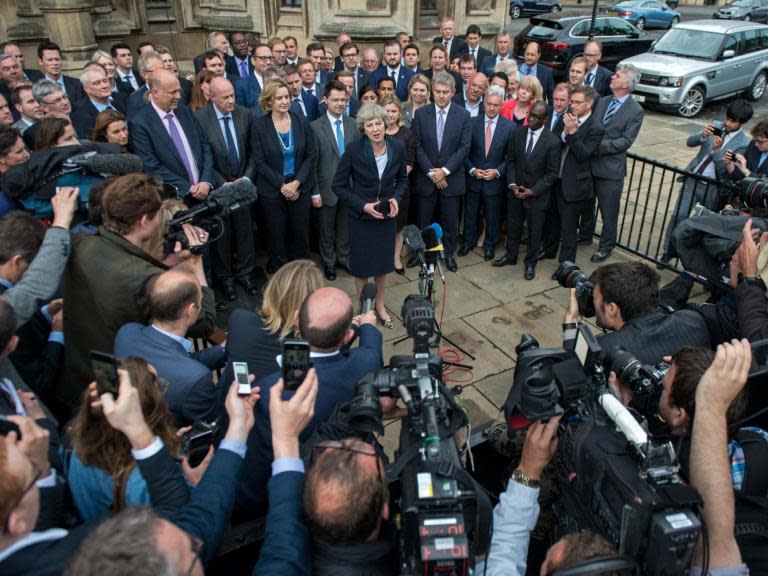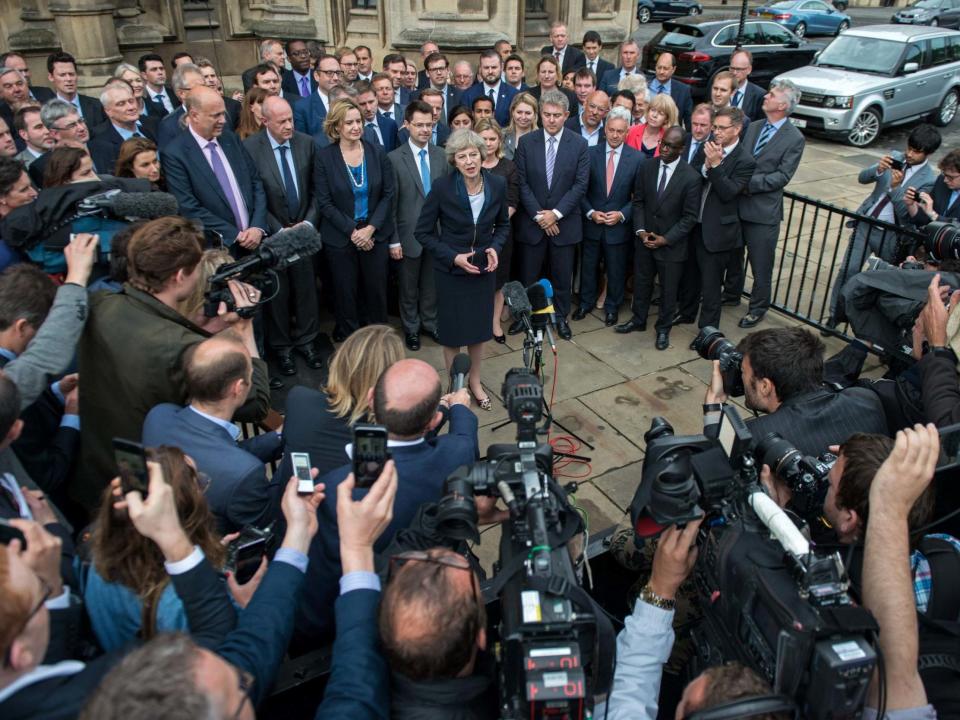Brexit has never been about EU membership. It's always been about money and political power
I have, since 2016, been an avid (some would say, obsessive) observer of the whole Brexit debacle, and have come to thoroughly despise the attitude of the two main parties.
They remind me of nothing more than two giant battling male elephant seals – in their struggle for dominance, utterly heedless of the females and babies crushed under their lumbering bulk. Farage, like some opportunistic beta male, is shoving his way into the fray in the hope of a little action, equally uncaring of the fate of the rest of the herd.
Make no mistake, this epic battle is not so much about EU membership as about power, political and financial. May’s desperate efforts were more focused on keeping her fragmenting party together and in Number 10, rather than “getting the best deal for the nation”, whereas Corbyn’s main aim was (and still is) to wrest the keys of Downing Street from the Tories. Farage and his rich businessmen friends see an opportunity to increase their profits by a “bonfire of regulations”, particularly employment and environmental.
Where in all this is the “for the many”? Where is the “stable government”? We, the poor downtrodden electorate, are just like the crushed and bleeding seals, tossed on the rough tides of political ambition, our wishes and needs ignored, useful only as voting fodder when the need arises.
A plague on all their houses! It’s time to stand up and demand what is the best for us and our country: no Brexit; a new, fairer voting system; and politicians who put their country and constituents before personal ambition.
Susan Jarosz
Melrose
A dubious legacy
People are talking about Theresa May's place in history. Theresa who?
Sarah Pegg
Seaford, East Sussex
Courage calls to courage everywhere
Now May has gone, is there not a single politician who has the courage to turn and face the people of the United Kingdom and say: “We have made a terrible mistake. Our future is as a leading and reforming nation within a united Europe. We must have no more divisive referenda. We must revoke Article 50. We must remain in the EU and we must deny access to the European Parliament to any MEP candidate who refuses to accept and support the existence of that parliament and a united Europe.”
Westminster MPs cannot take their seats until they swear allegiance to the crown and parliament.
Martin Deighton
Address supplied
No tears needed
Do not weep over the demise of Theresa May as prime minister. That she leaves office in ignominy is entirely due to her own wretched political behaviour, which has seriously wounded our country.
As Home Secretary she thoroughly disliked immigration (remember her “Go Home or Face Arrest” vans). In the 2016 referendum she was a closet-Brexiteer, and once she became prime minister she thought that her great legacy would be Britain’s exit from the EU (which would bring back immigration control). To achieve this unwelcome goal, Article 50 had to be triggered and, once triggered, it was considered irreversible.
In October 2016 May as prime minister decided she herself could trigger Article 50 by exercising the Royal Perogative, avoiding parliamentary approval. But on 29 March 2017 parliament did trigger Article 50. So far, so good, thought May.
On 8 June 2017 May lost her overall majority in a new general election which she herself had called, so on 26 February 2018 she arranged a grant of £1 billion to the Northern Ireland government to enlist the support of the Democratic Unionist Party (DUP) whereby she would have their parliamentary support for Brexit. A stridently political bribe of the first order, especially devious as Northern Ireland had voted in the referendum to stay in the EU. Thus on 26 June 2018 the government passed the European Union (Withdrawal) Act 2018 with a Brexit date of 29 March 2019. Mission Accomplished, thought May.
However, on 10 December 2018 the European Court of Justice held that Article 50 was reversible unilaterally, so May now adopted a new, demonstrably false tactic: namely, asserting that the 2016 referendum result was irreversible and must be implemented at all costs. Thus no second referendum was necessary or even appropriate. Yet even Jacob Rees-Mogg, an avid Brexiteer, had long ago said in a House of Commons debate held on 24 October 2011, “You could have two referendums. As it happens, it may make more sense to have a second referendum after the negotiation is completed”. Rees-Mogg was right on this one point.
The simple fact is that May with her indelible obstinacy lost sight of land in her Brexit ship and it has now hit the rocks and, deservedly without public remorse, she will now sink without trace.
David Ashton
Shipbourne, Kent
Theresa May: a scapegoat?
Will forcing Theresa May to resign change the stalemate in Brussels? Perhaps the UK is the only country where a political party changes its leader quite so often.
The question is, will the new prime minister use a magic wand in order to get more out of the Europeans than the previous leader? It is of no significance for the EU leaders who is across the table as far as their position is concerned!
British politicians have been exposed by their lack of collectiveness and in bewilderment they have found a scapegoat out of May: poor lady!
Imtiaz Ahmad Farooqui
Riyadh
Great love stories remain
Amidst the wreckage, pain and betrayal of Brexit, two strangely similar stories stand out to give us hope. We are touched by the lovely ongoing adventures of Michelle Bourke and her Cardboard Paul whose love continues to blow us away, let alone Paul; and the steadfast love of author Judith Kerr and her husband Tom as evinced in the picture book My Henry where, although Henry has died, the couple meet every afternoon to fly away again joyfully with each other. This transformative and enduring power of love and faithfulness shines out from the tears and gloom and exhorts us to carry on somehow despite the darkness of these times.
Linda Calvey
Northampton

 Yahoo News
Yahoo News 

